
Curriculum Vision
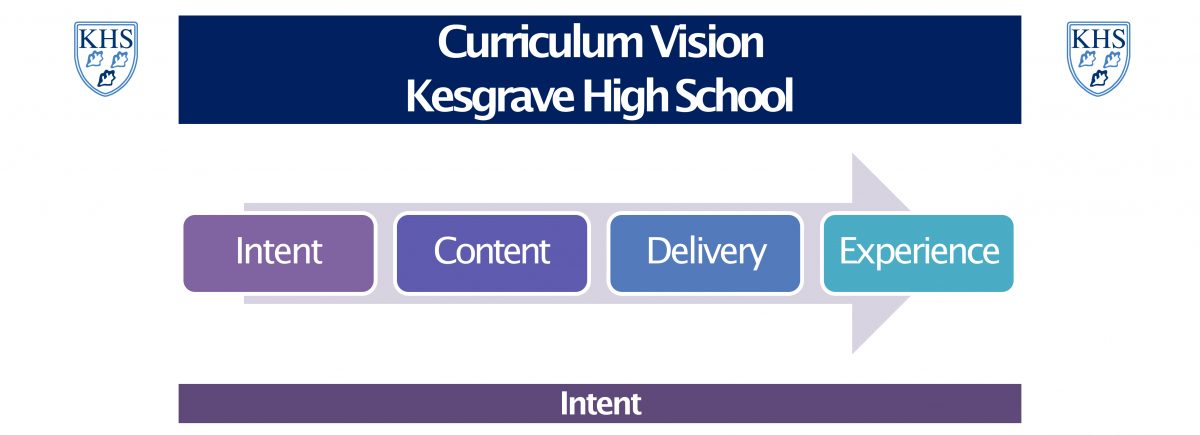
The Kesgrave High School curriculum aims to enable our students to become:
- Successful and curious learners
- Confident and resilient individuals
- Responsible and healthy young people
From a core established base, we review and adapt our curriculum regularly to ensure that it meets the needs of our learners and their lives in the 21st Century.
A broad academic knowledge base is crucial, alongside skills and personal development that ensures our students are able to learn and thrive.
Our curriculum aims to:
- Enable students, through a demanding, broad and balanced curriculum, to achieve as high a level of success as possible in public examinations.
- Challenge all students to the full realisation of their talents/potential.
- Help students acquire attitudes and skills relevant to their adult and working life, especially those related to independent thinking, and be able to adapt confidently to a changing society.
- Develop physical and social skills, an aesthetic appreciation and an understanding of health, hygiene and environmental issues.
- Engender respect for and tolerance of others – regardless of differences of race, disability, sexuality, gender, culture or religion.
- Encourage students to work together and participate fully in the life of the school and the wider community.
- Develop an understanding of the world in which we live, the interdependence of individuals and communities and an appreciation of human achievement and aspirations.
These aims are achieved through our subject curricula, PSHE curricula, Pastoral structure and extra-curricular offer.
Extra-curricular engagement is expected by all students at Kesgrave High School. These extra-curricular opportunities allow students to extend their knowledge and understanding and to improve their skills in range of artistic, creative and sporting challenges. These experiences support students’ development socially and emotionally.
Students’ spiritual, moral, social and cultural development and, within this, the promotion of fundamental British values, are at the heart of the school’s work. The development of these skills is captured in our audit, which encompasses curriculum, form and whole school activities.

Since September 2015 students there have been significant changes to Key Stage 4 and Key Stage 5 external assessment which have brought greater challenge and in many subjects more depth of knowledge.
Each subject will have a 5 Year Programme of Study.
Training time has been given to ensure that all staff are engaged in the development and review of these. The programmes will take into account recent changes to:
- Content and rigour of the new GCSEs
- Demands of English and Mathematics in the Primary Phase
- Changes to the assessment model in Year 7-9 (Implemented September 2020)
Each Departmental 5 year programme of study should:
- Provide a clear and coherent learning journey
- Foster subject-based understanding of new knowledge, concepts and methods
- Ensure students acquire knowledge and give opportunities for recall and application of this knowledge so that fluency is developed
- Require students to think and reason for themselves
- Explanations and resources should enable students to engage with and master the learning
- Learning should develop a depth of understanding that brings richness to the subject but also a breadth of understanding that enriches wider life and learning
- Develop a readiness for the next stage: be this the next lesson, the next unit of work, the next year or key stage; it prepares students for both academic, A Level, and future degree study, or vocational learning
- Contain appropriate, regular and robust assessment methods for measuring student progress and to allow intervention where progress is not as expected
Each Departmental 5 Year Programme of Study should ensure that there is an equality of provision and that all teachers:
- Have the subject knowledge required to deliver the curriculum
- Work collaboratively to share experience, expertise and resources
- Have a shared understanding of the type of learning that will support students’ development
- Engage in professional development that supports the successful delivery of the curriculum
- Can identify ongoing professional development needs
- Are supported by a programme of study that reduces teacher workload, through schemes of work supported with high quality resources (not lesson plans)

Students in Year 7, 8 and 9 take a full range of subjects, predominantly in mixed ability groups. Students are placed in ability sets for Mathematics from the latter end of the Autumn half-term in Year 7. These remain flexible to respond to the pace of student progression until the end of Year 10.
Students select their options within Year 9, starting their GCSE/BTEC programme of study at the start of Year 10. Core subjects of English, Mathematics and Science start the GCSE programme at an appropriate point of readiness within Year 9.
We offer an exceptionally broad range of subjects at KS4 and in the Sixth Form, catering for all interests and future pathways.
At Key Stage 4 students select freely four options subjects, one of which must be from the EBacc suite of qualifications.
Within the Sixth Form students can take A Level or BTEC qualifications. Most students select four options pathways and the timetable is built each year to try to accommodate all possible combinations. Students have free selection in order to shape the offer to meet the needs of each cohort.
The school operates a 3, 95 minute, period day and a fortnightly timetable.
In 2016 the school reviewed the Key Stage 4 offer to ensure that students’ curriculum was aspirational, broad and balanced. All students in Year 10 and 11 now follow a curriculum which is built on these principles.
The allocation of time 2023-24 is as follows:
We made two significant changes to our curriculum offer in September 2022. The first with regard to MFL delivery at KS3 and the second, with regard to our post-16 offer.
In September 2021 we changed our delivery of MFL in Year 7 to give all students a grounding in French. This was a change from a delivery which saw half of Year 7 study French and half, German. This decision was taken to build upon the languages studied at KS2 and provide a common base for all students in Year 7. During the course of Year 7 some students will be given the opportunity to select either Spanish or German for Year 8 and 9 study. This will create two pathways, with some students studying just French and others dual linguists in French and Spanish or German. Some students will be chosen for this pathway, along with an open offer to any who wish to make this choice.
Dual linguistics will have four lessons of MFL (two for each language) and one Ethics and Philosophy lesson. Single linguists will have three MFL lessons (French) and two EP lessons.
From September 2022 Sixth Form students will be expected, in the main, to take three Level 3 courses. Some may take four, following consideration of their qualifications upon entry. The options process in 2021 will provide advice and guidance (and significant taster experience in the Autumn and Summer Term) to make sure that students make informed choices.

The curriculum offer is constantly reviewed and changes made to suit the needs of varying cohorts and for individual student need.
Reviews are undertaken by the leadership team, with middle leaders and governors.
Student experience is reviewed through regular monitoring of behaviour and attendance, reviews of attainment outcomes and progress (both external and internal data), departmental reviews (which include lesson observations, student perception interviews, review of assessment and work scrutiny).
Termly interim reporting of attainment and behaviour for learning is analysed to review student engagement and if needed, intervene to support this.
Student achievements are recognised within the awarding of the 3Bs and Golden Tickets . Achievement assemblies celebrate success which is both academic and achievements beyond lessons.
Case studies for the most vulnerable review the impact of learning and wider strategies to ensure their engagement and progress. Where needed for individual students and small groups, a bespoke curriculum offer is in place. This utilizes both in-school interventions and external quality-assured provision.
Attendance, behaviour for learning and engagement all considered valuable measures.
Click HERE to view KHS Curriculum Maps
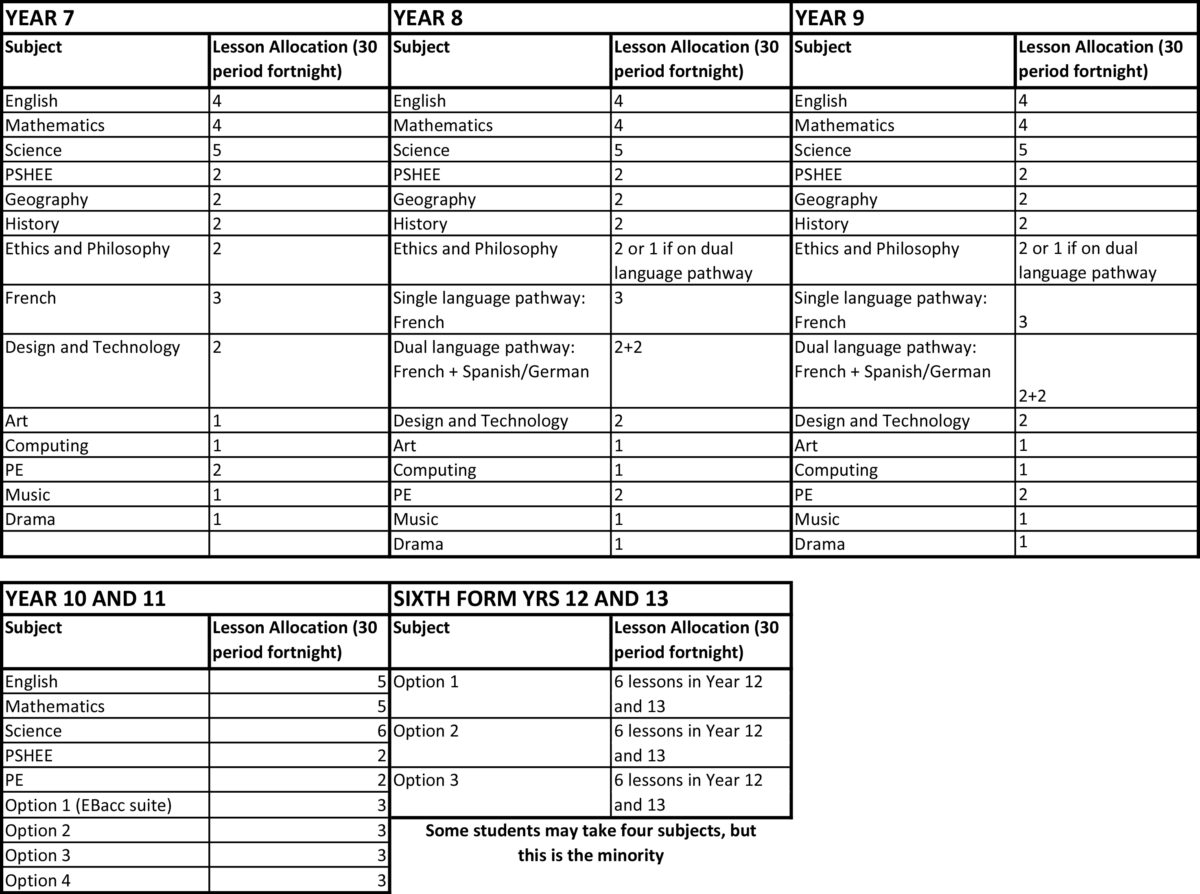
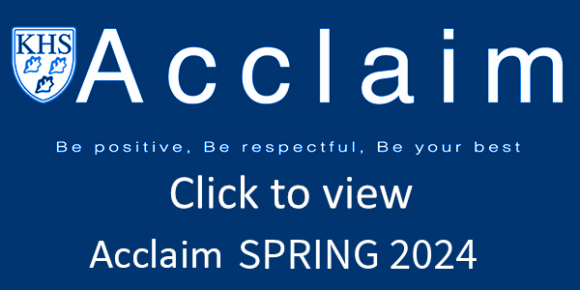
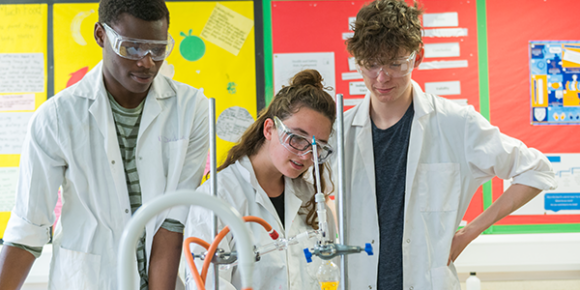
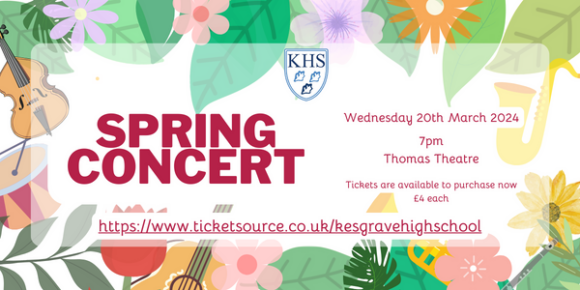
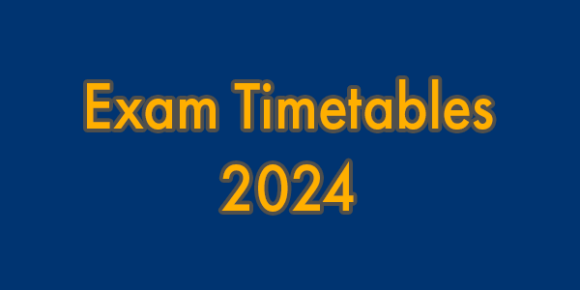



























Accreditations & Memberships